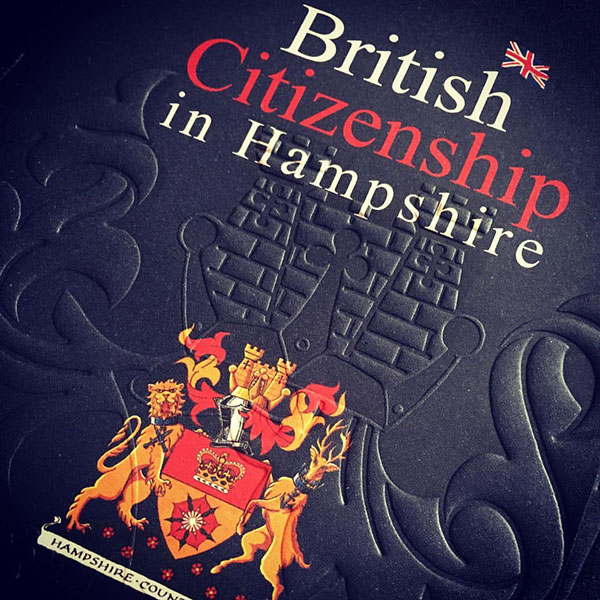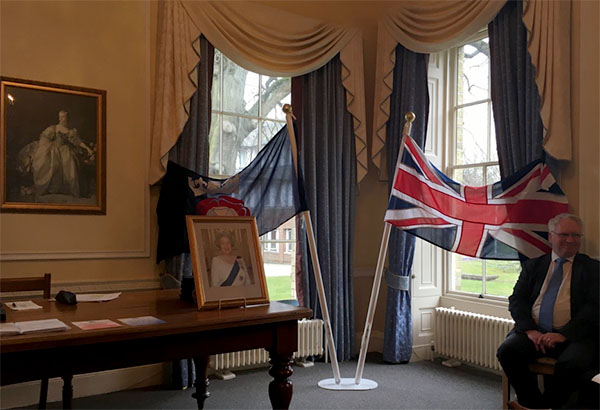A major life event has recently taken place for me, and I'm excited to share it: British citizenship! On Thursday, I had to return to Basingstoke in order to obtain my British citizenship certificate at the citizenship ceremony. This is the final step in the citizenship process and has been a long time coming for me. My story is below with some tips on the process that showcase my experience from the start of my British experience.

I was born in America (United States), and after a visit to the UK with some university professors and classmates in the spring of 1998, I dreamed of returning. I was able to join the BUNAC student work exchange programme, and I used this as part of my job experience that was required for my university degree. By the way, BUNAC stands for Britain/United States/New Zealand/Australia/Canada, and it's a work exchange programme for six months for students of these major English-speaking countries to go to another country to live and work. I was in the programme in 2000 for six months, and I moved over to the UK by myself; I did not know anyone.
I enrolled at Bournemouth University to return to the UK and obtain my Master's degree on a student visa. From there, I had a visa extension and was sponsored for two separate visas by two employers. In addition to this, I obtained my own visa under the HSMP (highly skilled migrant programme) and extended it twice, which was the limit that it could be extended.
I had to wait a month before my last visa extension expired before I could apply for indefinite leave to remain (ILR), which was the next step. You were not allowed to apply until a month before the visa expired.
Before actually making this part of the application, applicants need to take the 'Life in the UK' test, and those from non-English speaking countries must also take a language exam and go through a few more hurdles. I spent the spring studying for that test and took/passed the exam in the early summer of 2012.
Once those hurdles were finished, the ILR visa can be applied via post or in person. I did look for available applications in person as you can apply for the ILR in person or via the post. Biometrics are also a part of the process, but this is submitted upon request by the Home Office.
I checked availability for face-to-face ILR submissions a few weeks before my visa expired, but there wasn't availability. The post way had always been fairly quick for me, so I opted for that and thought that it would not take long. (Actually, the lack of no spaces for face-to-face availablility I later learned was due to dodgey people outside the UK buying the spaces up to sell at a premium!) When applying for ILR, you have to submit a tonne of paperwork, and you also have to surrender your passport. You cannot get these documents back, and you just have to play the waiting game. I honestly didn't think it would take so long as my visas were very quick to process, and I received them back in a short time. My brother was getting married in January, so getting the documentation was very important. I honestly believed that I would receive it back in time for my brother's wedding.

I did not get my documentation back. I missed my brother's wedding. I was very upset about that. In fact, it took all of nine months to get my ILR approved and the documentation returned. There were known backlogs in processing applications at this time.
Please do not make the same mistake I did (although it was not my fault about the lack of availability). Always apply for the ILR in person. If you need your passport back suddenly, then your submission for ILR becomes invalid. Don't chance it. Most face-to-face applications for ILR are made the same day. Sure, it costs a little more, but then you have peace of mind and your documentation and passport in your possession.
I received my ILR in April of 2013. After two years of holding an ILR, you can apply for citizenship as long as you have met the additional requirements, such as not being out of the UK for a long period of time. I could have applied a little earlier than I did, but they are constantly brining about changes to the system and increasing the fees, so I decided to do it. Another major factor was that the last company that I was working at wanted me to go out to their European branch every now and again. I wanted the ability to freely travel in the European Union, and the queues for the "All other passports" was really wearing on me.
I started the application process for citizenship last summer. The Home Office took approximately five months to make the decision about my citizenship. (Upon receipt of the paperwork, you are asked to get your biometrics done at one of the special post office branches, and I also had to do this for the ILR too.) If the application passes, you are sent the details about the ceremony. The ceremony is the last step. (Of course, you still have to apply separately for a British passport.)
The ceremony is a formal process where you state a pledge and invite a couple of friends or family to share your experience. Photographs are taken that you can buy (or take your own), and you really do not need to speak that much. It was all formal but done in an informal way. Each person is then called up to sign the document. We were told at the beginning about where everyone in the room was from, and a list of countries were rattled out. It was an easy process, and you don't need to prepare for it. You just need to bring a form of identification and the invitation to the ceremony. You receive the legal document, a certificate, a small gift (we got pens at Basingstoke) and additional paperwork about what you need to do after the ceremony. (You have to send your biometrics back to the Home Office and apply separately for your passport, for example.)
I am glad that this final step is complete, and it really has taken a lot to get here. It caused me to miss my brother's wedding (one of the most important family events that I don't think anyone should miss), and it cost a lot of time, effort, and money. It is not a step to take lightly. Particularly if your nationality does not allow you to have dual citizenship. (I personally think they could have given a better gift than a pen; a gold medal would have been nice!)
The cost of immigration is expensive, and I've probably spent around £20,000 in total. That includes cost of visas, photographs, biometrics, fees to the Home Office, solicitor fees, the exam costs, postage, and this does not include the time it takes to get all of your documentation together.
I hope that this guide has helped others know the involvement of what is required to obtain citizenship. Have you been through the process or are you currently going through the process now?



Leave a comment